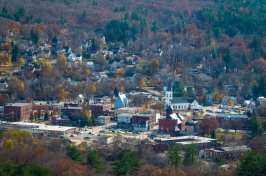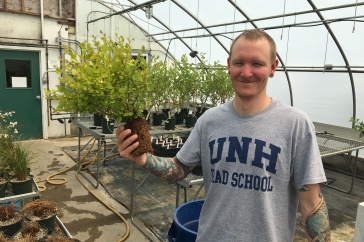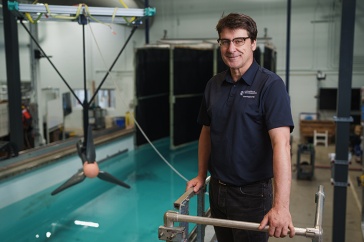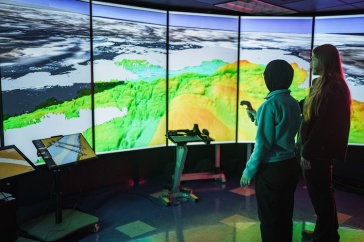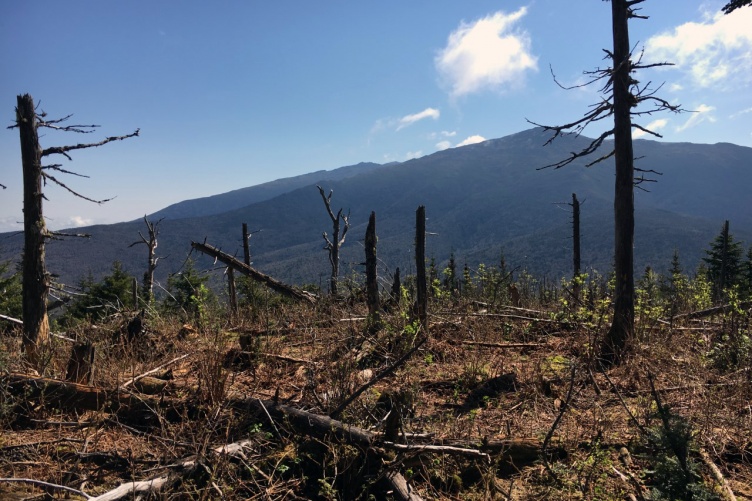
Researchers will use drone-based light detection and ranging to identify and predict forest features critical for snowshoe hare and American marten in the Northern Forest.
Three researchers from the University of New Hampshire will receive grants for research that will address priority issues facing forest stakeholders in the Northern Forest region. These three grants total nearly $600,000 are among 11 announced by the Northeastern States Research Cooperative (NSRC) directors, who represent the 26 million acres of the Northern Forest region in Maine, New Hampshire, New York, and Vermont. These 11 NSRC grants total $1.5 million in federal funding and $800,000 in matching private sector, state, and nonprofit organization support.
“I’m thrilled UNH will receive this federal funding from the Northeastern States Research Cooperative to support the Northern Forest,” Senator Jeanne Shaheen said. “This funding will boost research to spur economic growth and job creation in rural northern Granite State communities, support climate resilience and enhance the stewardship of our natural resources. Safeguarding New Hampshire’s forests and prioritizing our rural economies will continue to be a top priority for me in the Senate.”
“This significant federal funding to UNH will strengthen efforts to protect the Northern Forest region, which is an essential part of our state’s economy and way of life,” Senator Maggie Hassan said. “The funding from the Northeastern States Research Cooperative will support research into improving the Northern Forest region’s climate resiliency and safeguarding our precious natural resources. I am pleased to be announcing this $1.5 million grant and I will keep working to secure resources to help our northern communities thrive.”
The Northeastern States Research Cooperative is a competitive grant program for Northern Forest research with allocations to the program directed by the USDA Forest Service. Research goals for the program are to sponsor research to sustain the health of northern forest ecosystems and communities, develop new forest products, and to improve forest bio-diversity management. Since its inception, the cooperative has funded more than 335 projects, engaging 50 different institutions, agencies, and organizations across the Northeast.
“The Northeastern States Research Cooperative is an essential partner in preserving our region's 26 million acres of forestry, and I am thrilled to help announce that UNH researchers will receive more than $1.5 million in funding to bolster the great work that is already underway,” Congressman Chris Pappas said. “I am confident that this additional support will allow UNH to continue pioneering research that supports our forestry industry, ecosystem, and way of life.”
“In Congress I have been proud to fight for robust funding for the Northeastern States Research Cooperative grants,” Congresswoman Annie Kuster said. “Sustainable forestry is one of the backbones of our Granite State economy, but it is facing unique challenges. I’m so pleased to see these grants going to support world-class research at the University of New Hampshire. Their dedicated work will help protect our forests and ecosystems for generations to come.”
Heidi Asbjornsen, associate professor of natural resources and the environment with the UNH College of Life Sciences and Agriculture and researcher with the NH Agricultural Experiment Station, and her collaborators plan to focus on understanding the capacity of using “assisted migration”— moving tree species into areas where they normally do not grow but where scientists anticipate the future climate will be favorable for that particular species—to enhance the ability of future forests in the Northern Forest Region to adapt to warmer, drier climates.
Northern forests provide goods and services such as timber, fuel, and other wood products; reliable supplies of clean water; habitat for plant and wildlife species; recreational opportunities; and a diversity of non-timber forest products such as tree syrups, mushrooms, and forage production. The research is important because the rate at which the climate is changing in the Northern Forest Region is likely outpacing the natural ability of tree species to migrate into future suitable habitats, threatening the sustainability of both forest ecosystems and local communities.
“The results of this research will provide forest managers and landowners with practical tools for improving the health of future forests and their capacity to continue to provide these important goods and services to people living in the region,” Asbjornsen said.
Jessica Carson, research assistant professor with the Carsey School of Public Policy, plans to estimate patterns of COVID-era migration in the Northern Forest region, including identifying the extent of migration, the characteristics of migrants, and the features of communities that are most attractive to migrants. While popular press and local anecdotes continue to paint a picture of people fleeing urban areas to take refuge in amenity-rich rural regions, regional planners have been unable to quantify this migration, complicating community planning efforts to serve and support residents, old and new, Carson said.
“In the short term, many of us are experiencing the side effects of a ‘hot’ housing market in the region and seeing our local infrastructure stretch to deal with the pandemic’s fallout at the local level. Understanding what new needs and opportunities might arise as a function of short-term migration influxes can be helpful in orienting those responses,” Carson said.
In the longer-term, communities in the region are facing the possibility of substantial and enduring change, as climate uncertainty, natural disasters, and an impending wave of Baby Boomer retirements spur ongoing migration. Identifying factors that “pull” migrants into one part of the region, using the pandemic as an example of a longer-term trend, helps inform stakeholders’ long-term planning for future migration, she explained.
Alexej Sirén, a postdoctoral research associate of natural resources and the environment with the UNH College of Life Sciences and Agriculture, will use drone-based Light Detection and Ranging to identify and predict forest features critical for snowshoe hare and American marten in the Northern Forest.
“Wildlife often require microhabitat features to fulfill basic life-history requirements such as resting and denning. For example, downed logs and dense thickets caused by trees uprooted by wind or logging can provide snowshoe hare and martens protection from predators and harsh weather. Ultimately, the distribution and availability of these microhabitats are thought to impact populations and influence biodiversity,” Sirén said.
Researchers expect the findings to demonstrate how microhabitat influences biodiversity and informs forest management to balance wildlife and economic needs. The research also will provide tools and guidance for large landowners to map and manage forests, and economic opportunities for small businesses and hobby drone users to map smaller parcels.
Founded in 1887, the NH Agricultural Experiment Station at the UNH College of Life Sciences and Agriculture is UNH’s first research center and an elemental component of New Hampshire's land-grant university heritage and mission. We steward federal and state funding, including support from the USDA National Institute of Food and Agriculture, to provide unbiased and objective research concerning diverse aspects of sustainable agriculture and foods, aquaculture, forest management, and related wildlife, natural resources, and rural community topics. We maintain the Woodman and Kingman agronomy and horticultural research farms, the Macfarlane Research Greenhouses, the Fairchild Dairy Teaching and Research Center, and the Organic Dairy Research Farm. Additional properties also provide forage, forests, and woodlands in direct support to research, training, and outreach.
The University of New Hampshire is a flagship research university that inspires innovation and transforms lives in our state, nation, and world. More than 16,000 students from all 50 states and 71 countries engage with an award-winning faculty in top ranked programs in business, engineering, law, liberal arts, and the sciences across more than 200 programs of study. UNH’s research portfolio includes partnerships with NASA, NOAA, NSF, NIH, and USDA, receiving more than $100 million in competitive external funding every year to further explore and define the frontiers of land, sea, and space.
-
Written By:
Lori Tyler Gula, PhD | NH Agricultural Experiment Station | lori.gula@unh.edu | 603-862-1452
































